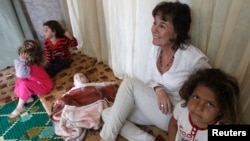UNITED NATIONS —
The U.N. Security Council expressed deepening concern Wednesday that Lebanon’s stability could be weakened by the growing impact of the Syrian crisis on its smaller neighbor.
The 15-nation Security Council issued a statement urging Lebanon to recommit to its policy of dissociation regarding the Syrian conflict, as it copes with a mounting refugee crisis, cross-border fire, domestic sectarian tensions, and the direct participation of at least one Lebanese group in the Syria fighting.
Speaking to reporters, French Ambassador Gérard Araud said Lebanon is threatened to be engulfed by the Syrian crisis and that recommitting to a policy of dissociation is the only way for Lebanon to avoid being dragged into that conflict.
“I think it is nearly a miracle that this country has succeeded to resist to the incredible pressures and tensions which are stemming from the Syrian crisis," said Araud. "For more than two years now, the Lebanese have avoided the worst. But the situation is worsening every day.”
Growing issues in political vacuum
Lebanon currently has no government. Prime Minister Najib Mikati quit in March and the caretaker prime minister, Tammam Salam, has yet to form a government. Political tensions among the many religious factions are growing while the economy is contracting.
The Security Council expressed concern about recent violence in two major Lebanese cities and a car bomb explosion this week in Beirut’s southern suburb.
Adding to this, Hezbollah, the militant Shi'ite group, has openly said its fighters are helping President Bashar al-Assad’s army battle rebels in Syria.
Lebanon, which suffered its own civil war from 1974 to 1990, is now hosting the largest number of Syrian refugees of any country. The United Nations says nearly 600,000 are officially registered, but many more are not. The Lebanese government estimates the refugee number at slightly more than one million - a huge burden on a country of less than four million people and a territory only about 10,000 square kilometers.
Plea for international support
But despite the impact of the refugees, Lebanese Ambassador Nawaf Salam said the country will not close its borders.
“Let me stress three things: one, Lebanon will not close its borders; Lebanon will not turn back any refugee; Lebanon will continue to provide assistance to all Syrian refugees,” said Salam.
Unlike Syria’s other neighbors who are hosting refugees, Lebanon does not have formal camps for them. The Syrians have been absorbed into existing communities, which are now overwhelmed.
Ambassador Salam said Lebanon cannot cope on its own with the burden of the refugee crisis and he appealed for international support.
The 15-nation Security Council issued a statement urging Lebanon to recommit to its policy of dissociation regarding the Syrian conflict, as it copes with a mounting refugee crisis, cross-border fire, domestic sectarian tensions, and the direct participation of at least one Lebanese group in the Syria fighting.
Speaking to reporters, French Ambassador Gérard Araud said Lebanon is threatened to be engulfed by the Syrian crisis and that recommitting to a policy of dissociation is the only way for Lebanon to avoid being dragged into that conflict.
“I think it is nearly a miracle that this country has succeeded to resist to the incredible pressures and tensions which are stemming from the Syrian crisis," said Araud. "For more than two years now, the Lebanese have avoided the worst. But the situation is worsening every day.”
Growing issues in political vacuum
Lebanon currently has no government. Prime Minister Najib Mikati quit in March and the caretaker prime minister, Tammam Salam, has yet to form a government. Political tensions among the many religious factions are growing while the economy is contracting.
The Security Council expressed concern about recent violence in two major Lebanese cities and a car bomb explosion this week in Beirut’s southern suburb.
Adding to this, Hezbollah, the militant Shi'ite group, has openly said its fighters are helping President Bashar al-Assad’s army battle rebels in Syria.
Lebanon, which suffered its own civil war from 1974 to 1990, is now hosting the largest number of Syrian refugees of any country. The United Nations says nearly 600,000 are officially registered, but many more are not. The Lebanese government estimates the refugee number at slightly more than one million - a huge burden on a country of less than four million people and a territory only about 10,000 square kilometers.
Plea for international support
But despite the impact of the refugees, Lebanese Ambassador Nawaf Salam said the country will not close its borders.
“Let me stress three things: one, Lebanon will not close its borders; Lebanon will not turn back any refugee; Lebanon will continue to provide assistance to all Syrian refugees,” said Salam.
Unlike Syria’s other neighbors who are hosting refugees, Lebanon does not have formal camps for them. The Syrians have been absorbed into existing communities, which are now overwhelmed.
Ambassador Salam said Lebanon cannot cope on its own with the burden of the refugee crisis and he appealed for international support.




